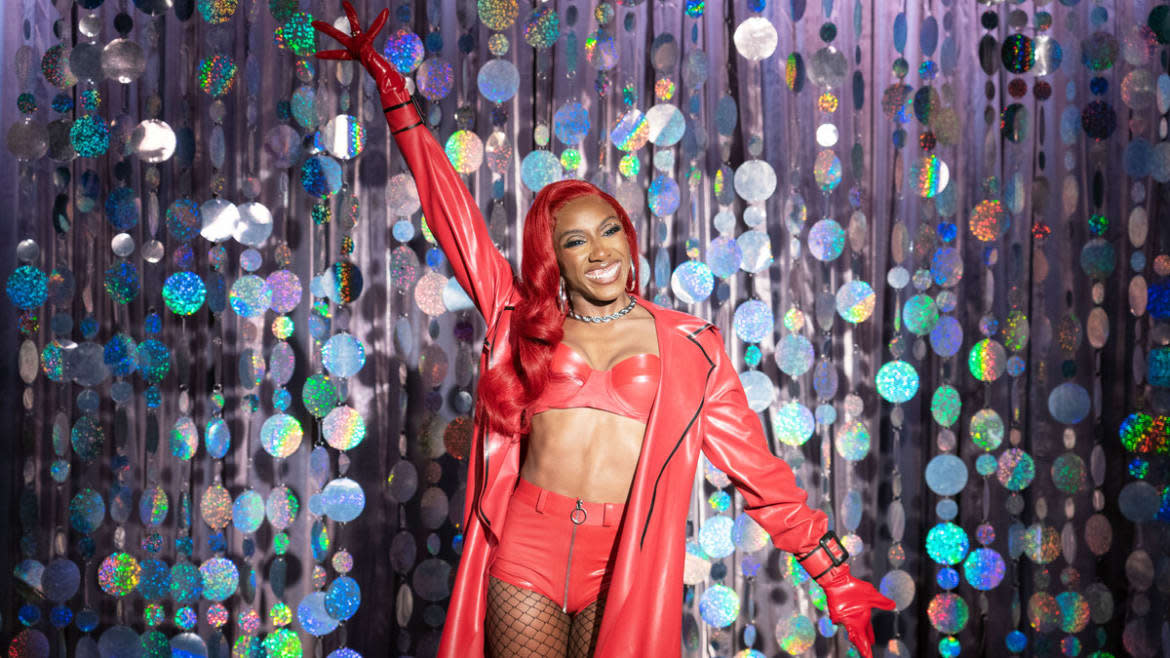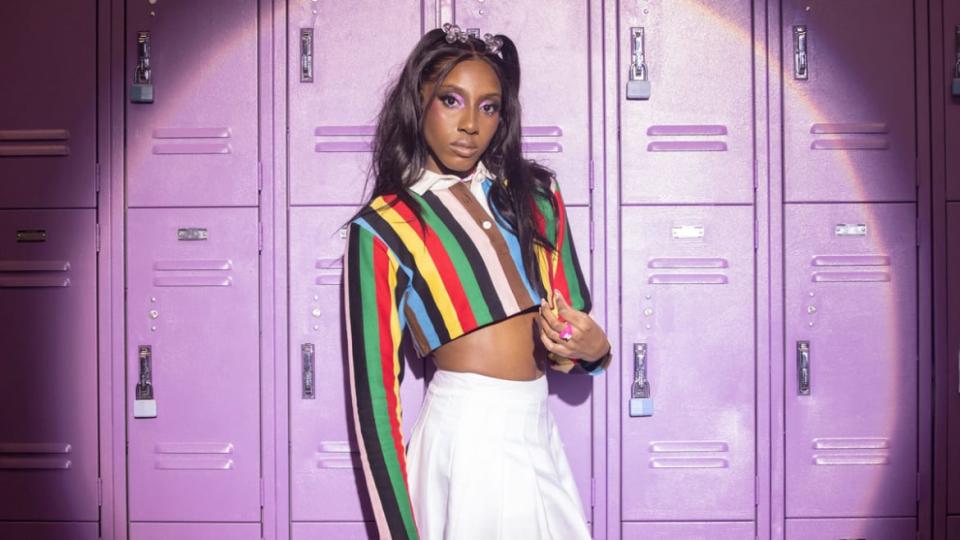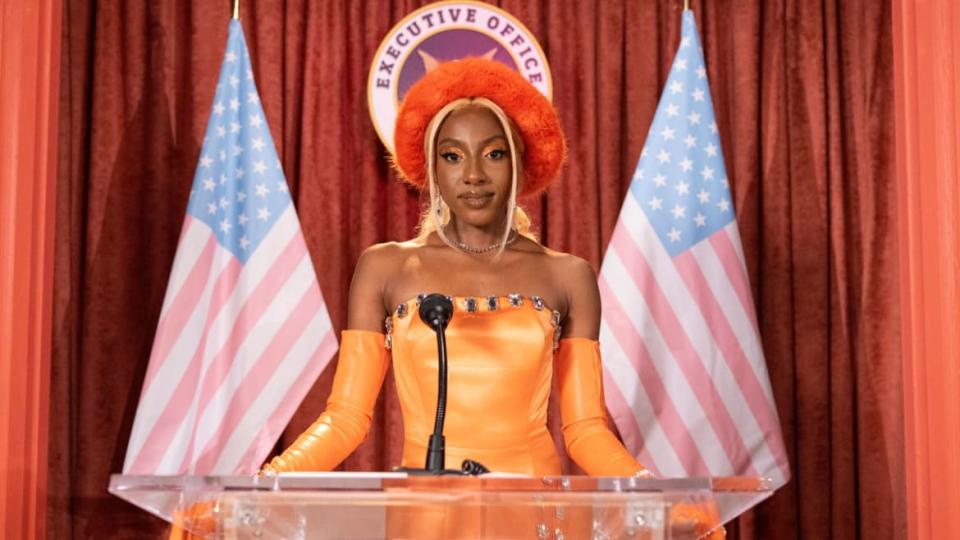Ziwe’s Talk Show Is Beating the Jimmys at Their Own Game

- Oops!Something went wrong.Please try again later.
I found Ziwe like so many did, through the viral clips that consistently make rounds on Twitter.
The clips all have the same vibe: Ziwe, looking consistently beautiful in the trendiest fashion and full glam, sitting in her entirely millennial-pink talk show set, stares down a squirming celebrity. Ziwe is not just asking the hard questions, but the impossible ones. Her guests’ comments are taken out of context, misquoted in the chyrons plastered beneath them, and edited awkwardly as they try to talk about the big issues. To agree to be on Ziwe is to agree to look bad, the very opposite of a traditional talk show set-up.
In the world of Ziwe (and it is, indeed, her world: All credits in the opening titles—starring, producing, musical performances, consulting—are attributed to herself), celebrities are forced to sit in the hot seat and stay there. Ziwe is ready to take the rich and famous down a peg—staring outward from her gorgeous graphic eyeliner at her uncomfortable guest, an often disbelieving smile across her face, oozing a persona of extreme, unshakable confidence. She delights in costume jewelry, pink index cards, impossibly tall heels.
As celebrities become increasingly desperate to brand themselves as good people, the talk show stage has become a space to virtue signal in an uncritical spotlight, buoyed by Jimmy Fallon’s repetitive signature cackle, James Corden’s exclamatory interruptions, or, until recently, Ellen DeGeneres’ well-documented faux kindness reserved only for important celebrities in an otherwise highly toxic work environment. Ziwe is a breath of fresh air, an antidote to the draining talk show cycle.

Ziwe is not the first show to satirize talk show aesthetics (the nihilistic, tortuous The Eric Andre Show, running now for six seasons, comes to mind immediately), but Ziwe’s polished sheen and its similarities in form to more traditional talk shows (the nice set, the weird thematic games, the sketches, songs, and opening monologues that center Ziwe as our host and guide) run parallel to, and more obviously skewer, what can be so exasperating about the various cookie-cutter talk shows of right now.
Boring games and karaoke are replaced on Ziwe with games like “Who is the Wokest Ally?” or “Historical Tops or Bottoms.” Political stances from celebrities are often bleeped out (when Emily Ratajkowski critiques the Obamas, for example, her mouth is blurred, with a caption underneath reading “sorry to the obama family, see you at the roc nation brunch. idk what’s wrong with lena dunham’s friend”), while interviews with political figures are often given with the same arched eyebrow that she would give to a celebrity (“Do you have any stance on apartheid? Yay, nay? Cool, no?” Ziwe needles Andrew Yang).
In the newest season, guests are encouraged to partake in the “Apology Cam”, with levels of apology ranking from “Sorry” to “Atone”. Some do better than others—Chet Hanks flat-out refuses to apologize for his patois dialect appropriation, Ilana Glazer seems actually interested in taking accountability for her Broad City “Yas Queen” bit, drag queen Katya Zamolodchikova goes for a broad, unequivocal, ironic apology after she attempts to do a lip sync to Martin Luther King Jr.’s “I Have a Dream” speech. Ziwe blankly nods along to all of them—there’s no winning.
Despite her curated persona of glamorous self-centeredness, Ziwe seems genuinely interested in uplifting the voices she works with. Where James Corden can’t even name the cameramen he works with every night, Ziwe regularly brings her writers, producers, and crew to the forefront of her show. Sure, it’s often to accuse them of being problematic in a segment she calls “Behind the Writer’s Studio”, where Ziwe makes her staff writers explain themselves for riskier sketches, but their banter reveals a sense of connective and communal energy in their creative process.
As the most recent and particularly delightful pride themed episode shows, despite Ziwe’s “all-about-me” aura, her persona actually ensures we know little about the real Ziwe at all—a testament to her curated character. In the opening interview with drag queen Katya, Katya asks of Ziwe, “Are you gay?” Ziwe stares her down challengingly: “Am I gay?”
This exchange becomes thematic for the whole pride show: a song called “Queer Bait” sung by Ziwe, followed by the occasional ask from a fellow writer or interviewee about her sexuality. It’s never clarified. Because Ziwe, at least in the insulated world of her show, doesn’t have to explain herself, doesn’t even have to be authentic. Everyone else is to be held responsible, to answer for themselves.
For Ziwe’s non-satirical talk show contemporaries, the format can feel like a space of uncritical praise, an echo chamber of a complete lack of self-awareness. One only has to watch the brief clip of Paris Hilton and Jimmy Fallon blandly describing their new Bored Ape NFTs to inexplicable applause to feel the near existential emptiness of these shows. Hilton sits before the audience, spewing buzzwords; she’s so proud to be a part of the community, she likes to be a voice and share her platform to get the word out about NFTs.
It’s just killer, a near perfect encapsulation to show how little it all means, how far we have fallen from the days when talk shows had at least the goal of boosting talent, making us actually laugh à la Conan, or keeping guests on their toes à la Letterman’s spicier, more needling style.
Ziwe’s New Late-Night Series Is Off to a Truly Iconic Start
Where other talk show hosts and formats seem determined to give us nothing, Ziwe is always ready to give it her all—from her fashion choices to her peppy, all-out dance performances, to her readiness to pull questionable receipts on any guest at any moment. By extension, those celebrities that agree to appear on her show instantly seem more self-aware and, almost paradoxically, like nicer, funnier, cooler people than those appearing on more traditional talk shows.
More often than not, one comes away from an episode feeling that the celebrities willing to go on Ziwe and play by her rules—the likes of a deferential Ilana Glazer or an ironic, slightly stiff, very funny appearance from Phoebe Bridgers—are more charming than anything.

Ziwe is sharp as can be, trendily up-to-date, interested in talking about the big issues in her own winking, hot-girl way, but most importantly, she also taps into something so lacking in modern talk shows—the ability to roast celebrities, to point to the ridiculousness of their very existence. Ziwe creates a space where these highly privileged people cannot win.
I delight in the most basic tenets of Ziwe—her silent gazing out at a tense guest, her ironic love of girlbossery, her refusal to answer to anyone. Ziwe doesn’t necessarily seem invested in changing the game or dismantling the system. It’s a show more interested in creating some tangible discomfort, for one fleeting moment, among the rich and famous. Their lives are too easy, their lack of criticism in public forums lacking—Ziwe is here to settle that score in her own distinct way, and to be hot and funny while she does it.
Get the Daily Beast's biggest scoops and scandals delivered right to your inbox. Sign up now.
Stay informed and gain unlimited access to the Daily Beast's unmatched reporting. Subscribe now.

